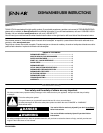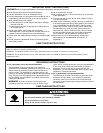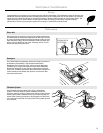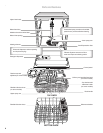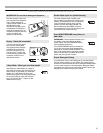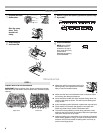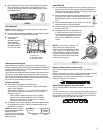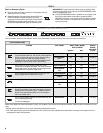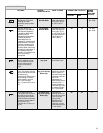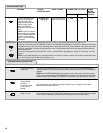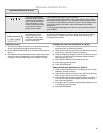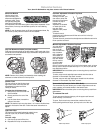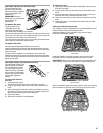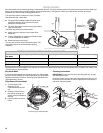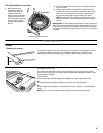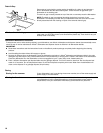
7
Add Detergent
NOTE: If you do not plan to run a wash cycle soon, run a rinse
cycle. Do not use detergent.
■ Use automatic dishwasher detergent only. Add tablet, powder
or liquid detergent just before starting a cycle.
■ Fresh automatic
dishwasher
detergent results in
better cleaning.
Store tightly closed
detergent container
in a cool, dry place.
Premeasured Detergents
Many detergents now come in premeasured forms (gel packs,
tablets, or powder packs). These forms are suitable for all hardness
and soil levels. Always place premeasured detergents in the main
compartment and close the lid.
Using dishwasher detergent tablets and packs have been proven
better than powder, liquid or gel detergents to reduce filming on
your dishes. By using these tablets and packs, over time this will
start to reduce or eliminate white film. Also, by using a rinse aid you
can minimize repeat buildup of white film.
Powder and Gels
■ The amount of detergent to use depends on:
How much soil remains on the items - Heavily soiled loads
require more detergent.
The hardness of the water - If you use too little in hard water,
dishes won't be clean. If you use too much in soft water,
glassware will etch.
Soft to Medium Water (0-6 grains per U.S. gallon)
[typical water softener water and some city water]
Medium to Hard Water (7-12 grains per U.S. gallon)
[well water and some city water]
■ Depending on your water hardness, fill the Main Wash section
of the dispenser as shown. Fill the Pre-Wash section to the
level shown, if needed.
NOTE: Fill amounts shown
are for standard powdered
detergent. Follow
instructions on the package
when using other dishwasher
detergent types.
Add Rinse Aid
■ Your dishwasher is designed to use rinse aid for good drying
performance. Without rinse aid your dishes and dishwasher
interior will have excessive moisture. The heat dry option will
not perform as well without rinse aid.
■ Rinse aid keeps water from forming droplets that can
dry as spots or streaks. They also improve drying by
allowing water to drain off of the dishes after the final
rinse.
■ Rinse aid helps to reduce excess moisture on the dish
racks and interior of your dishwasher.
■ Check the rinse aid indicator. Add rinse aid when indicator
drops to “Add” level.
■ To add rinse aid, turn the dispenser cap
to “Refill” and lift off. Pour rinse aid into
the opening until the indicator level is at
“Full.” Replace the dispenser cap and
turn to “Lock.” Make sure cap is fully
locked.
NOTE: For most water conditions, the
factory setting of 2 will give good
results. If you have hard water or notice
rings or spots, try a higher setting. Turn
the arrow adjuster inside the dispenser
by either using your fingers or inserting
a flat-blade screwdriver into the center
of the arrow and turning.
Select a Cycle (cycles vary by model)
See “Cycle and Option Descriptions” charts in the following
section.
Efficient dishwashers run longer to save water and energy, just like
driving a car slower saves on gas. Typical cycle time is
approximately 2 1/2 hours, but can take less or more time to
complete depending on selections.
Select Options (options vary by model)
See “Cycle and Option Descriptions” charts in the following
section.
You can customize your cycles by pressing the options desired. If
you change your mind, press the option again to turn off the option.
Not all options are available for every cycle. If an invalid option is
selected for a given cycle, the lights will flash.
■ When loading silverware, always place sharp items pointing
down. Mix items in each section of the basket with some
pointing up and some down to avoid nesting. Spray cannot
reach nested items.
STEP 2
A
B
C
MAIN WASH
PRE-
WASH
Soft Water
Hard Water
Soft Water
Hard Water
A. Cover latch
B. Main Wash section
C. Pre-Wash section
Soft Water
Hard Water
Soft Water
Hard Water
Main Wash Pre-Wash
STEP 3
Full
Add
Lock
Refill
6
5
4
3
2
-
-
-
max
fill
1
-
-
-
-
-
-
-
-
-
-
-
¹⁄₄
turn to lock
6
5
4
3
2
-
-
-
max
fill
1
-
-
-
-
-
-
-
-
-
-
-
-



